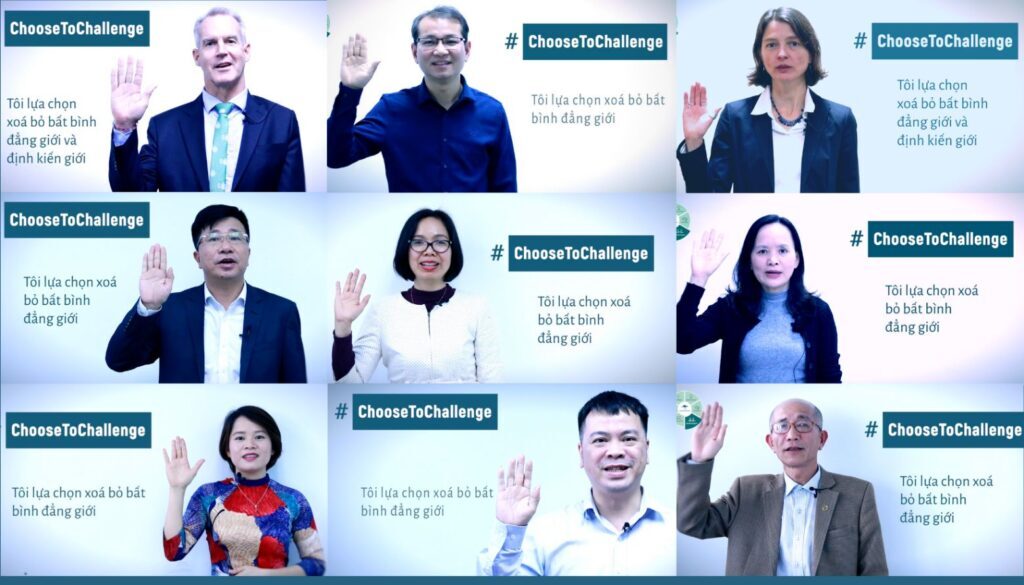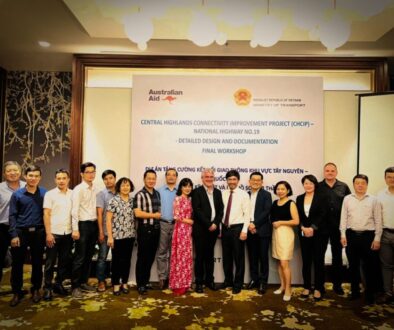Aus4Transport stakeholders #ChooseToChallenge Gender Inequality
IN BRIEF
Gender equality and women’s empowerment are fundamental topics when it comes to creating a fair society and sustainable economic development. It is for this reason that Aus4Transport ensures every Program activity works towards mainstreaming gender equality and social inclusion and aims to boost women leadership across the transport sector in Vietnam.
As part of its continuous efforts to advocate for Gender Equality and Social Inclusion, Aus4Transport, supported by its stakeholders, joined the International Women’s Day campaign #ChooseToChallenge, raising our hands high to stand against gender inequality and gender bias.
KNOW MORE…
We, the Aus4Transport team, together with many of our committed stakeholders, got together to publicly explain how, each of us, promotes gender equality in their personal and professional lives. The aim of the campaign was to encourage more people to commit to helping forge a more inclusive and happier society. It was a great success!
Aus4Transport would like to thank everyone who participated in the campaign for all their dedication and commitment:
- Nguyen Anh Dung, Deputy Director of the Department of Planning and Investment of the Ministry of Transport,
- Cao Thi Lan from PMU2,
- Le Minh Dao, Deputy Director General of VIWA,
- Dolores Viloria, the Gender Equality and Social Inclusion Specialist working in Aus4Transport two largest projects,
- Mr Pham Hoai Chung, Deputy Director of the Transport Development and Strategy Institute,
- Ms Tran Thi Kim Dang, Highway Engineering lecturer at the Đại học Giao thông Vận Tải – University of Transport and Communications in Hanoi,
- Vu Thanh Phuong, Vice Rector of the Institute for Transport Administration and Management Cadres (ITM),
- Ms Tran Thi Thanh Thuy, Deputy Director General of the International Cooperation Department under the Ministry of Transport,
- Ms Stefanie Stallmeister, World Banks’s Operations Manager for Vietnam, East Asia and the Pacific,
- Mr Andrew Barnes, Deputy Head of Mission of the Australian Embassy, Vietnam, and
- Aus4Transport PMC – DT Global Team in Hanoi.
The interviews highlighted a range of interesting topics, and provided an outline of the current situation, as well as the perceptions held by men and women regarding gender roles in Vietnam, particularly, within the transport sector.
How could a more balanced lifestyle help bring improved opportunities for Vietnamese women in the future? Why do women face special difficulties when it comes to getting promoted to senior leadership positions? Did you know that 8 out of 10 victims of Human Trafficking in Vietnam are women and girls from ethnic minorities? Do Vietnamese women equally share rights, responsibilities and decision-making power with their husbands? How can Gender Equality contribute to #Vietnam’s economic development? Should (and can) the new generation of Vietnamese women think differently about family life?
Data showing the situation of women in Vietnam is, generally, quite encouraging, especially when compared to other countries in South East Asia. For example, more than 70 per cent of Viet Nam’s working-age women are in the labour force, compared to the average of 44 per cent in Asia and the Pacific. However, Vietnamese women are underrepresented in decision-making jobs as, despite they account for nearly half of the labour force, less than one fourth of them are in overall management roles. As both, the men and women who shared their stories in our campaign confirmed, there is still a lot of room for improvement when it comes to gender equality in the country. Vietnam is progressively introducing legislative changes and setting ambitious medium and long-term targets to ensure increased gender equality and a larger share of women in decision-making. Australia is partnering with the Government of Vietnam to reduce the gender gap in leadership and in transportation. Aus4Transport is proud to be part of these efforts and assist on bringing legal regulations and frameworks into tangible outcomes.
Although there is a general perception that promoting equal rights and developing a more inclusive society depends exclusively on big policy changes, that is not all that can be done. It is true that appropriate laws and regulations are very important to support positive progress. However, it is important not to underestimate our individual power, the power we all have to make an impact and drive change for a more fair, sustainable and equitable world.
Have you ever asked yourself what small actions you can take to support gender equality day by day? If you haven’t, now it is a good time to think about this and put your ideas into action.




